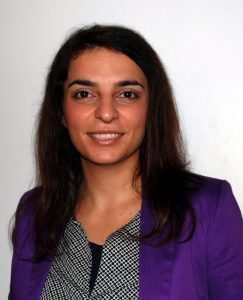Name: Zoi Dokou
Title/Department: Assistant Professor/Civil Engineering/California State University, Sacramento
Phone number: (916) 278-4611
Email: zoi.dokou@csus.edu
Website: www.csus.edu/faculty/d/zoi.dokou
Research focus: Groundwater modeling, groundwater surface water integration, optimization methods
What excites you most about your PIRE research? My role in this project involves groundwater modeling applied at the Blue Nile Basin at two different scales: regional and local, considering both irrigated and rain-fed sites. The groundwater models are driven by seasonal forecasts, and coupled with a watershed and a crop yield model to provide predictions of groundwater, river and lake or reservoir levels and expected crop yields. The results can provide governments, farmers and development agencies valuable advance information to guide water-related decisions. This in turn will help local communities establish food security and growth, a prospect that makes this research work very exciting. The challenge of course will be the successful adoption of these forecasts by local communities. Another aspect of the overall PIRE project that excites me the most is its interdisciplinary nature: by integrating research, education and outreach it aims in bringing people and resources together to promote the human-climate-water-agriculture nexus in the Blue Nile Basin region. It is very rewarding for me being part of such an effort.
What’s the most valuable aspect of your research for the people and communities? Ethiopia’s high inter-annual variability in local precipitation has resulted in droughts and floods that stress local communities and lead to continued land degradation and economic and food insecurity. On the other hand, Ethiopia has large reserves of groundwater that could potentially be used for increasing agricultural growth. The groundwater model forecasts aim to inform farmers and small-scale irrigated agriculture communities about the impact of different water uptake strategies on the seasonal dynamics of their local water resources. This will provide increased food security and promote growth for the low income communities, especially those more vulnerable to climate variability. In addition, the modeling effort can provide guidance to governments and development agencies for more efficient management of the groundwater reserves of the country.